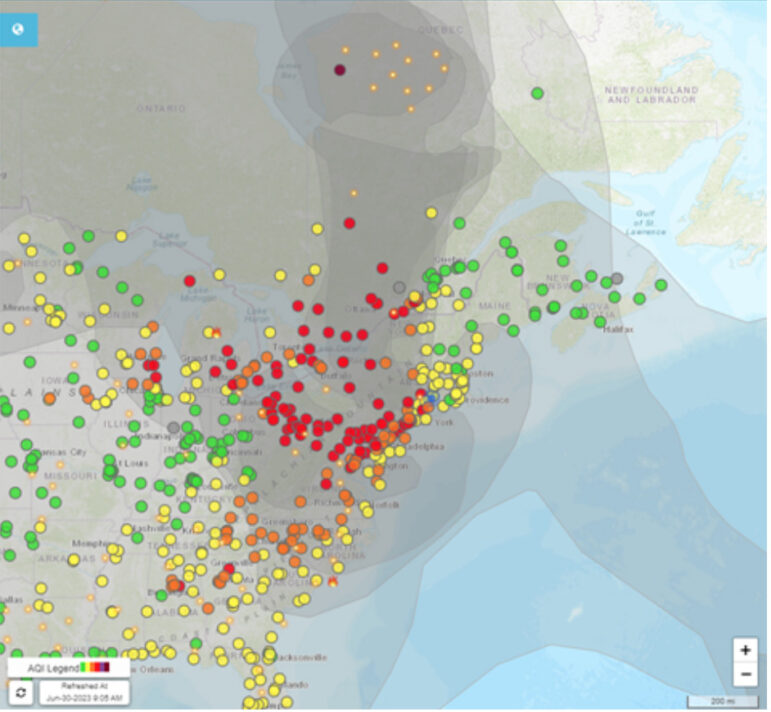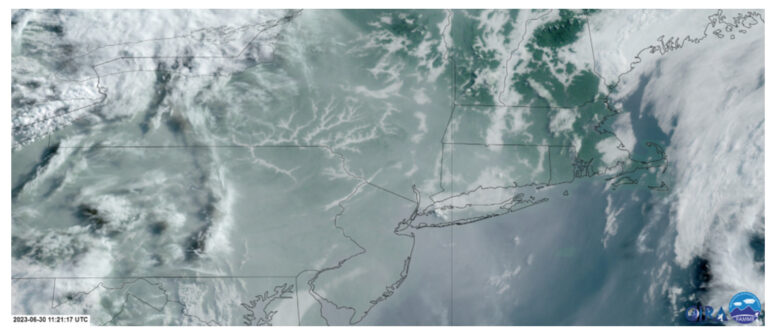Connecticut’s Department of Energy and Environmental Protection (DEEP) is expecting smoke from wildfires over Quebec to elevate fine particulate matter PM2.5* levels on Friday, June 30.
*The term fine particles, or particulate matter 2.5 (PM2.5), refers to tiny particles or droplets in the air that are two and one half microns or less in width.
These levels are expected to exceed Unhealthy levels for the entire state.
Health Effects of PM 2.5 Air Pollution
When air quality is forecasted to be Unhealthy, there is an increased likelihood for everyone and especially members of sensitive groups to experience health effects. DPH recommends that those in sensitive populations, which includes children, seniors, and those with heart or lung disease, limit time outdoors and avoid strenuous outdoor exercise. Everyone else should reduce long or intense activities outdoors. Also, it is important to take more breaks during outdoor activities.
“We are once again experiencing impacts in Connecticut from burning Canadian wildfires,” said DEEP Commissioner Katie Dykes in a release on Friday. “Levels of fine particulate matter (PM2.5) are expected to reach unhealthy levels. We recommend that children and adults with respiratory disease follow guidance from the Connecticut Department of Public Health to protect themselves from experiencing symptoms from elevated air pollution. Air quality awareness is important, and we encourage residents to sign up to receive our daily air quality forecasts on the DEEP website, or visit AirNow.gov to stay apprised of local air quality.”
“During these poor air quality events, residents should take precautions to protect themselves, including closing windows and doors to help keep smoke out of the home. We recommend those with asthma, and heart and lung conditions avoid outdoor exercise today,” said DPH Commissioner Manisha Juthani, MD.
“The health effects for some people may include chest tightness, shortness of breath, wheezing, coughing, eye irritation, chest pain, dizziness or lightheadedness, and other symptoms,” Juthani continued. “Even healthy adults who spend prolonged periods outdoors working or exercising should minimize exertion and take more breaks. Residents also should have medications readily available and seek medical attention if symptoms worsen. During the last instance of poor air quality from wildfires, we saw a rise in asthma-related visits to the emergency department, particularly in children over the age of 5 years. Staying indoors is the best way to reduce exposure.”
How do Forest Fires in Quebec Impact Connecticut?
Major wildfires are still burning across Quebec. The wildfire smoke from Quebec is being funneled through Western New York and Pennsylvania due to high pressure and northeast winds. Friday, winds will shift from westerly to southerly, allowing for the plume to push into Connecticut.
The following image shows the smoke plumes from the EPA Fire and Smoke Map. The satellite image from today shows a thick smoke plume just west of Connecticut, with an even a thicker smoke plume over New York State into Canada. Currently, the PM2.5 levels in Connecticut are in the moderate to unhealthy range.


https://portal.ct.gov/DEEP/Air/Forecasting/AQI/Air-Quality-Index
Stay connected and access the daily AQI forecast and real-time air quality data
• Follow us on Twitter @CTAirQuality
• Go to EPA’s AirNow webpage
• Sign up to get Air Quality alerts through Enviroflash
• Call 800-249-1234
• Download EPA’s AirNow app for your phone
Ambient Air Monitoring
DEEP monitors, tracks, and forecasts daily air quality levels across Connecticut for ozone from May 1st through September 30 each year and for fine particulate matter (PM2.5) each day of the year. On April 30, 2023, DEEP began informing Connecticut’s regulated community and the general public of the ozone season via the State of Connecticut E-mail list serve and posting air quality forecasts on the DEEP web page, available here.
DEEP encourages daycare providers, summer camps and elder/senior centers to subscribe to the Air
Quality Index (AQI). Subscribing to the AQI is fast and easy and will provide you with important
information each day about Connecticut’s air quality through the spring and summer. The AQI link
provides facts and information regarding ground-level ozone, its health effects, what to do on a high
ozone day, and most importantly what you can do to help reduce ground level ozone in your backyard.